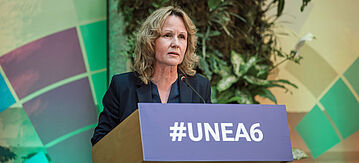The world’s most important environmental conference ends today in Kenya. Steffi Lemke praises successes for multilateralism
The sixth session of the United Nations Environment Assembly (UNEA-6) made decisive progress on the protection of global water resources. One resolution calls upon the UN member states to protect their water resources, manage them more sustainably and collect more accurate water-related data through improved monitoring. UNEA-6 also resolved to improve the management of hazardous chemicals and chemical waste. The Global Framework on Chemicals, which was adopted in 2023, will be anchored in the programme of work for the United Nations Environment Programme (UNEP) – and thus strengthened at international level. UNEA-6, which comes to an end today in Nairobi, Kenya, is the world’s top decision-making body for environmental matters. 140 environment ministers and vice ministers and almost 6,000 delegates spent five days in the Kenyan capital developing solutions to global environmental problems.
Federal Environment Minister Steffi Lemke commented: "Global environmental policy is facing enormous challenges, and geopolitical conflicts are making it hard to find good solutions. Nevertheless, the United Nations Environment Assembly is and remains a beacon of multilateralism in this difficult situation. Whether the focus is on the climate crisis, biodiversity loss or plastic pollution, we are thinking globally about these crises and actively pushing forward with solutions alongside our international partners. A good example is the resolution on water adopted at UNEA-6. It follows the simple logic that we need to better protect our water resources. Healthy ecosystems and intact natural environments are essential for this. Water protection is vital, especially for people in poorer countries in the Global South, who are particularly vulnerable to the impacts of the climate crisis."
Over 20 resolutions on various topics were negotiated at UNEA-6. The resolution on water calls upon the UN member states to improve their water management through national programmes. This applies, for example, to agriculture and water-intensive industries. From source to sea, coherent responses should be developed to better protect terrestrial, coastal and marine waters.
In another resolution, UNEA-6 also formally acknowledged the Global Framework on Chemicals – for a Planet Free of Harm from Chemicals and Waste (GFC). The GFC was adopted in September 2023 at the 5th session of the International Conference on Chemicals Management (ICCM5) in Bonn under German Presidency. The aim of the GFC is to make international chemicals and waste management safer, including phasing out the most hazardous chemicals as far as possible and finding alternatives. The intention of the resolution is to anchor the GFC in UNEP – and thus strengthen it internationally. The Federal Environment Ministry hosted an official side event at UNEA-6 on the content and requirements for the implementation of the framework, in which the Minister and stakeholders from many sectors took part.
Another key focus of this year’s session was that, with the Kunming-Montreal Global Biodiversity Framework adopted in Montreal and the BBNJ Agreement, historic milestones have been reached on biodiversity conservation and marine protection. The objective now was to use UNEA-6 to create further momentum for the implementation of these significant decisions, and to define an active role for UNEP and regional marine conventions. The Federal Environment Ministry successfully advocated for the resolution on ocean efforts to reflect a further contribution to the greater protection of oceans.
Federal Environment Minister Lemke met a number of fellow ministers in talks at events in Nairobi. At UNEA-6, she advocated for an ambitious, legally binding global agreement to reduce plastic pollution, which is currently being negotiated at UN level. On the African continent, which is particularly affected, numerous governments are taking specific measures, for example to restrict single-use plastic, such as the host country Kenya, where plastic carrier bags are banned. This, however, cannot even begin to solve the global, transboundary problem.
Background
The 193 member states of the United Nations form UNEA-6. UNEA sets priorities for global environmental policy and international environmental law. It promotes partnerships with a view to achieving environmental goals. The theme of this year’s assembly is: Effective, inclusive and sustainable multilateral actions to tackle climate change, biodiversity loss and pollution. Morocco holds the Presidency this year at UNEA-6. It was the first time that a Presidency from a country on the African continent led the negotiations. UNEP is headquartered in Nairobi.

